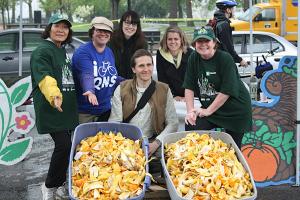Western Queens Compost Initiative
The WQCI is a dynamic partnership of CSA's, gardeners, and youth & civic associations, providing leadership, service, and education in composting!
Leader
Stephanos Koullias
Location
11-01 30th Ave Astoria, NY 11102
Impact areas
About the project
Composting! It not only reduces waste and its deleterious effects, but is a benefit to the environment. Compost adds vital nutrients back into the soil, helps prevent erosion, and increases moisture retention. It is cheap to make, and can be used to grow food as well as ornamental plants, without the need for complicated technology, further reducing dependency on petrochemical derived fertilizer.
The Steps
Our goal is to eliminate food waste from one community garden, two farmers markets, three bike tours, and four CSA's. Aside from the expanded outreach that 5 Master Composters will conduct to the 200+ members of the garden and their households , we will expand our operation to collect waste from two Greenmarkets, three bike tours that have rest stops in our community, and the four surrounding CSA's. Our five coordinators would oversee day to day operations, monitor tasks and work toward goals; liaison with officials at the local botanical garden; and conduct bike tours and educational workshops. Participating CSA members will assist in the transportation and processing of plant waste and kitchen scraps on weekends. Community gardeners will assist in tabling at bike tours, and helping to collect fruit scraps. Youth and civic organization volunteers will help table and collect waste at the Greenmarket. What we are in desperate need of to make this all happen is funds for a work trike and a storage shed for it. In addition, we need to purchase heavy duty tools, construct tumblers, and provide sites with collection receptacles & signage. The proceeds generated from this campaign will be used expand the capacity of the worksite to process fod waste. We hope you will also consider making a donation to our Kickstarter campaign for a work trike, for transporting food waste to the work-site. We also need volunteers! Composting is a dirty job, but one that will help us breathe a little bit easier. Come get your hands dirty!
Why we‘re doing it
"Landfills are a large source of methane. Methane is a potent GHG emission, with 23 times the global warming potential of carbon dioxide. Methane is emitted from landfills when biodegradable materials such as paper, yard trimmings, or food are placed in an anaerobic or oxygen-starved environment like a landfill. The amount of methane produced by these materials can be reduced either through technological improvements to the landfill or by preventing waste from ever reaching it. The City has intervened by requiring that paper be recycled. It collects yard waste through a City composting program. However, this program was first slated for elimination during the 2008 budget cuts, which troubled many community gardeners who received the compost produced by the program. Food waste is the exception – there are no efforts on the part of the City to divert food from landfills. This might be less problematic if food waste was a small part of the city's waste stream. In 2006, a study by the Department of Sanitation found that organic waste makes up 41.1 percent of the city's residential waste stream. Of that, 17.1 percent is food, four times the national average. The reason New Yorkers generate more food waste than the rest of the country remains unclear. We can be certain that most New Yorkers do not examine their food waste and adjust their actions and purchases to reduce their footprint. Taking these measures is an effective and important first step. The list of challenges to diverting a substantial amount of food waste from landfills is long. The City does not have a municipal facility to manage organic waste; nor are there mandates for businesses or residences to compost. In contrast, San Francisco became the first city in the United States to mandate that all residents and businesses separate their food waste from trash for recycling in 2009. New Yorkers, however, are left to create their own composting bin or pay for the export of waste.

